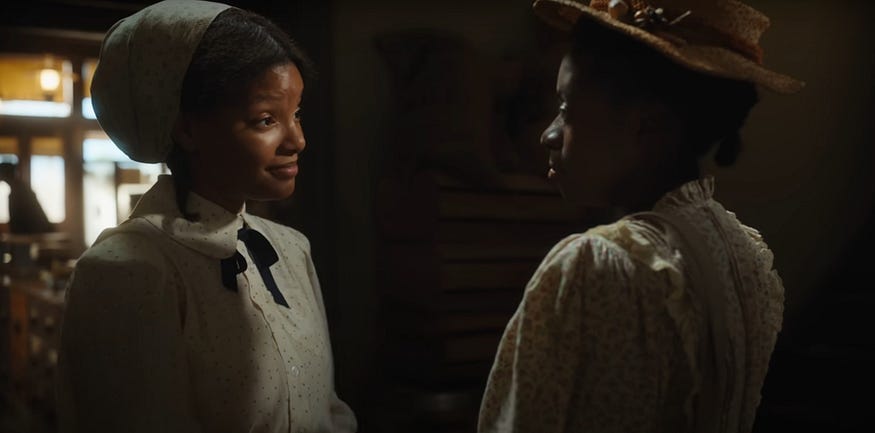Film Review — The Color Purple
Solidly put together, but the subject matter of Alice Walker’s novel feels ill at ease with the upbeat musical treatment
This new musical film version of Alice Walker’s Pulitzer Prize-winning novel, adapted from a stage show by Marsha Norman, Brenda Russell, Allee Willis, and Stephen Bray, went largely overlooked in the Oscar nominations, save for a Supporting Actress nod for Danielle Brooks. I see why, as I found The Color Purple to be a slightly strange film. Even though this take on Walker’s seminal text is finely acted and solidly directed, with well-choreographed songs, the upbeat musical treatment feels somewhat inappropriate, given the subject matter.
Opening in turn of the 20th Century rural Louisiana, the protagonist, Celie, is a fourteen-year-old pregnant via incest. Pregnant for the second time, in fact, with both babies ultimately taken from her and “given to God” by her father Alfonso (Deon Cole), who started raping her after the death of her mother. Amid this already horrifying scenario, Celie is given in marriage to the abusive Mister (Colman Domingo), who hits her and generally treats her like dirt as she struggles to raise his children from a previous marriage, including his son Harpo (Corey Hawkins). The only person who loves Celie is her sister Nettie, with whom she shares a special bond. But events conspire to tear them apart.
On the plus side, there are strong performances. Fantasia Barrino and Phylicia Pearl Mpasi acquit themselves well as older and younger versions of Celie. Ciara and Halle Bailey do likewise with Nettie. In the supporting cast, the aforementioned Danielle Brooks is particularly good as the strong-willed Sofia, Harpo’s first wife. Taraji P Henson also eats up the screen as Mister’s mistress Shug Avery, whose subplot involving her estranged father, Reverend Avery (David Alan Grier), provides important moral commentary on the narrative.
There have been unlikelier musicals with grimmer subjects in cinema history. Alice Walker’s story has plenty of narrative traditions that lend themselves to this sort of epic filmmaking; big emotions, empowering character arcs (as Celie learns to stand up for herself), and a few well-deployed Dickensian family revelations designed for maximum heartstring-tugging. And yes, despite the bleak subject matter, this ultimately winds up on a redemptive path, with strong messages about forgiveness, learning one’s self-worth, the power of sisterhood, and so forth. But there’s something dishonest and romanticised about Dan Lausten’s glowing cinematography, the fantastical imagery that sometimes accompanies musical numbers, and the general slickness of the production, which feels as though it ought to be grittier.
For me, the musical aspect just doesn’t gel with the story. With incest, rape, abuse, racism, inequality, and poverty rearing their ugly heads at regular intervals, the singing caused the story to lurch between undue perkiness and misery. This makes it uneven and difficult to settle into, even though, as per the earlier 1985 Steven Spielberg adaptation, the darker elements have been somewhat toned down.
Of course, Spielberg’s version was also criticised for this. In addition, he was accused of diluting the lesbian love affair between Celie and Shug to the point that it was barely noticeable. Spielberg remains unapologetic, and I like his film more than this one (with reservations). Still, it’s fair to say both the new film and the stage musical take their cue from the Spielberg film than from the novel. Indeed, Spielberg is present this time as producer, along with Quincy Jones (who both produced and wrote music for the original film), and Oprah Winfrey (who played Sofia in the original). Blitz Bazawule now occupies the director’s chair.
The result is… odd. I just don’t quite understand why The Color Purple needed to be turned into a musical. I’ll grant that the songs are occasionally quite show-stopping (especially Hell No! and Push Da Button). And yes, despite there’s some emotional impact, obviously. You’d have to have concrete in your veins not to be moved by the more dramatic moments. But these moments failed to form a fully cohesive, satisfying whole. A mixed bag then, probably worth a look if you’re a fan of the book or the Spielberg film, but certainly not a must-see.
(Originally published at Medium.)
The Dillon Empire beyond Substack
For a full list of my published novels, click click here.
For more on my novels and other projects, click here for my blog.
For my Patreon page, click here.
For my Medium page, click here.






I’ve read the book multiple times and watched Spielbergs film at least four or five times. I was surprised to see they were making another film and I haven’t seen it yet. I appreciate your review. I will likely watch it at some point because I am deeply familiar with the story. I’m confused as to how the story would make for a good musical but there was a musical aspect to the original film thanks to Shug Avery and historical speaking, music has been a significant part of the African American story.
The first time it was criticized for having a non-Black director (though, to his credit, Spielberg is no racist); the second time it gets criticized for being a musical about incest and rape (which is a rather squeamish idea).
Trivia note: Oprah Winfrey and Danielle Brooks are now among the few actors to be nominated in the same category for playing the same character, years apart.